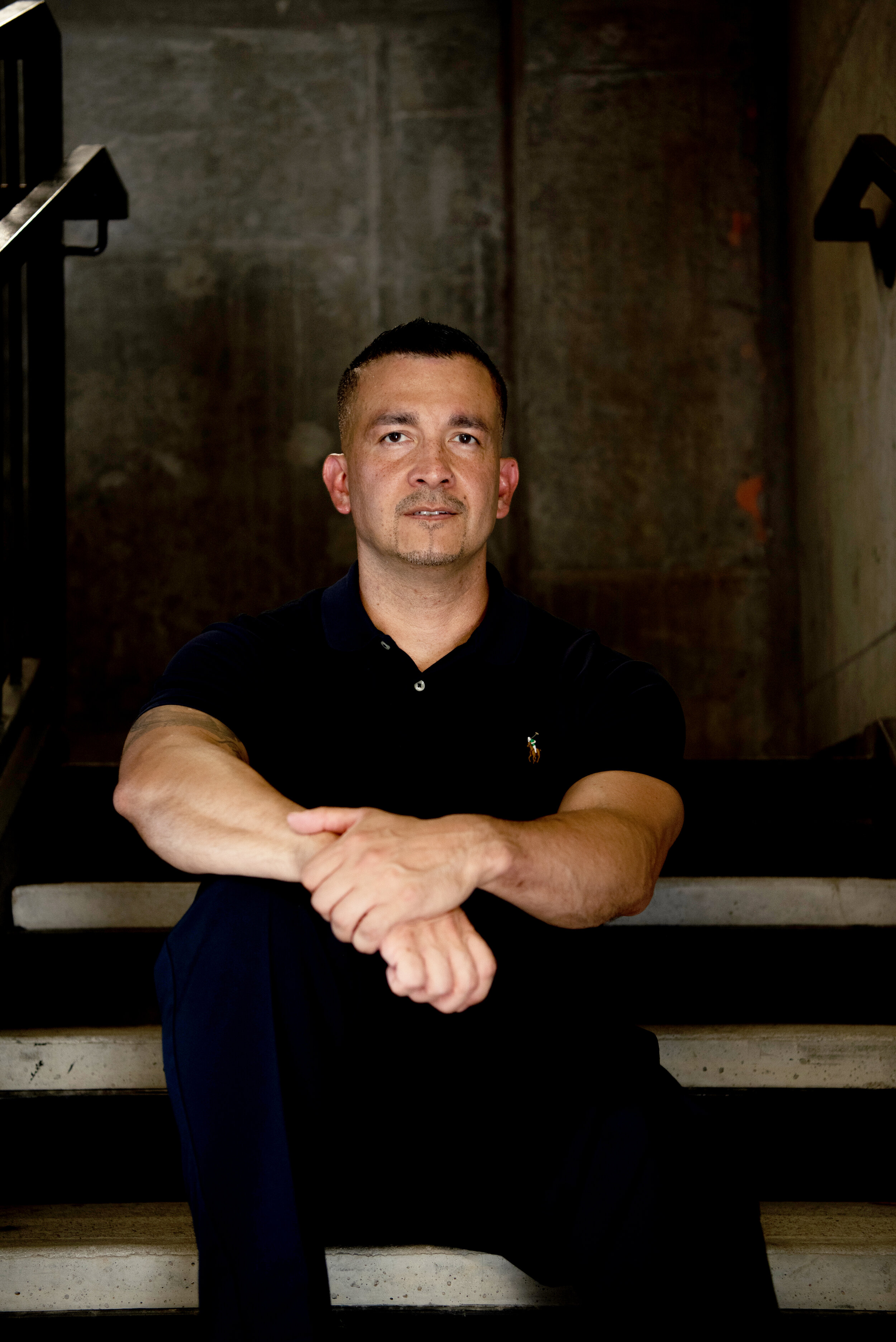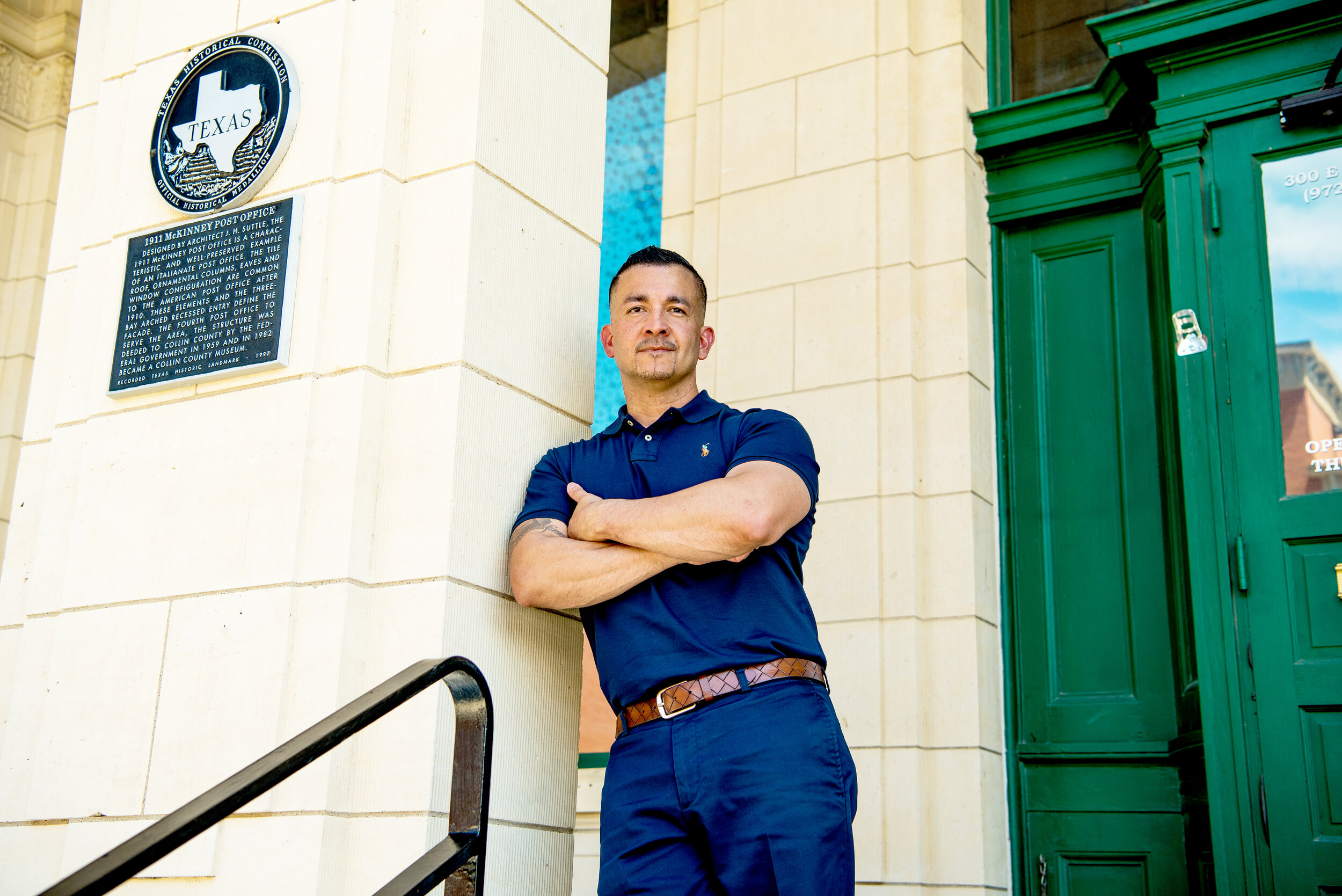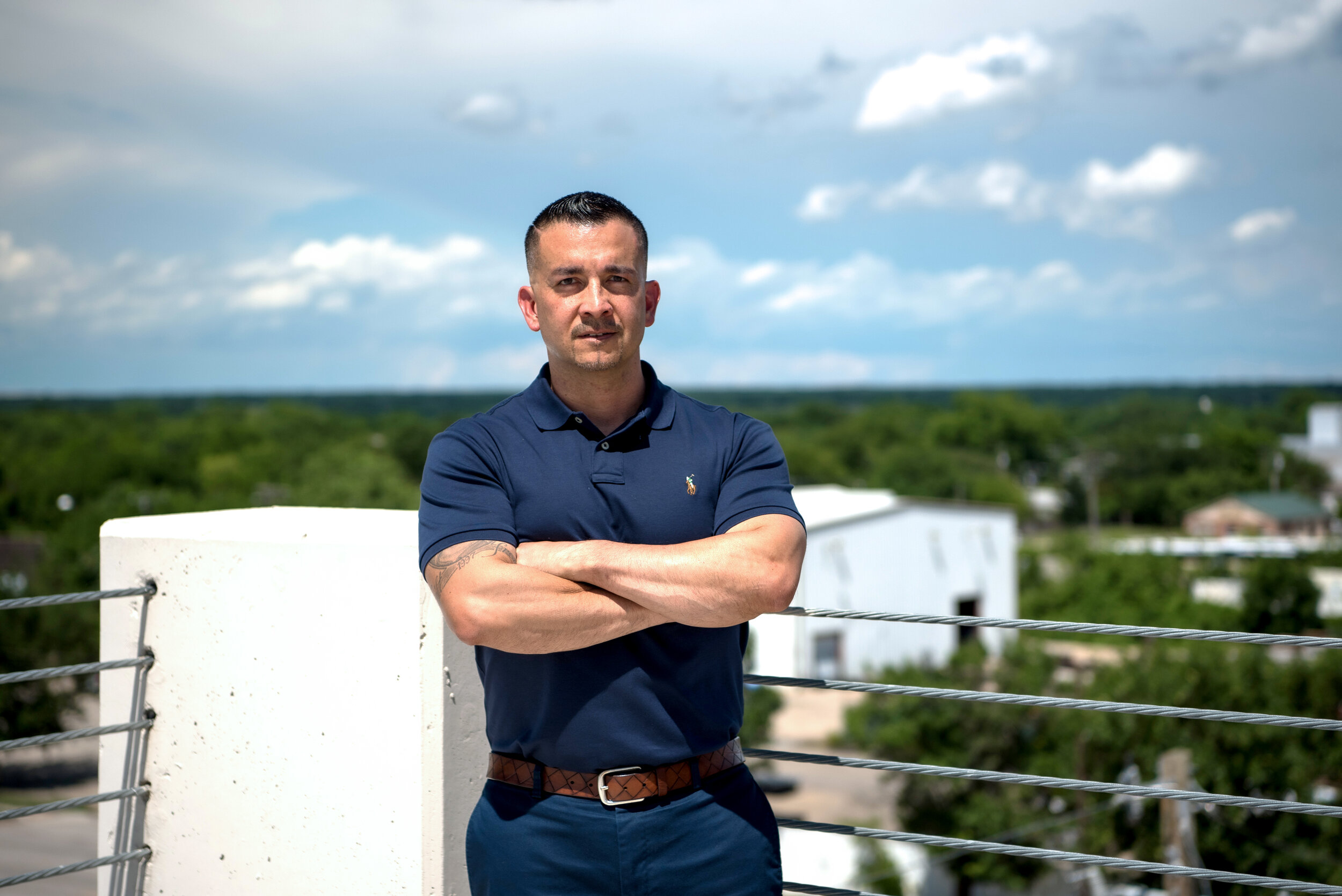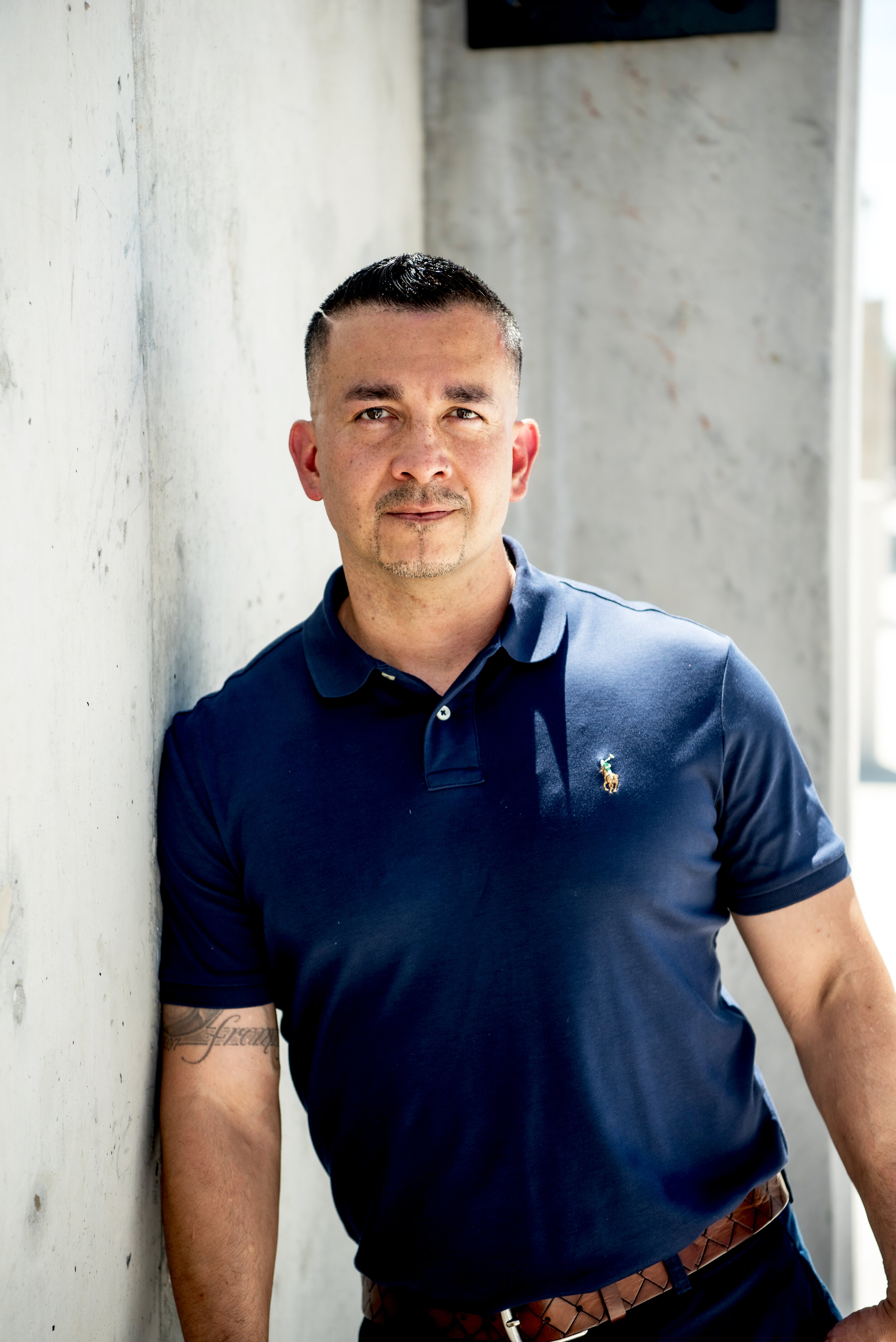Story by Dr. Alicia Schortgen. Photos by Stephanie Daniels.
When he was just 21 years old, Jason Hernandez received a life sentence without parole plus 320 years. One of thousands of nonviolent drug offenders convicted under federal mandatory sentencing policy and the ‘War on Drugs,’ Jason’s 1998 conviction hinged upon the testimony of his associates, many of whom were members of his family or lifelong friends. “I was really mad then,” says Jason. “Being testified against by your friends, people you said you’d die for… it hurt.”

Jason grew up in a close-knit family. Jason and his three brothers kept his parents busy with school and sports. He especially idolized his oldest brother, J.J. His parents worked multiple jobs to make ends meet, and Jason remembers his childhood fondly: “We were happy. My parents always made us feel loved.”
Jason was never in a gang or a cartel, but he had been selling drugs since the age of 15. His brothers sold drugs too. “I thought it was what I was born to do,” reflects Jason. He says he didn’t grow up around doctors or lawyers or even teachers. During his childhood, Jason’s east-side McKinney neighborhood consisted of hard-working immigrant families and a disproportionate amount of crime for Collin County.
Jason was arrested in his parents’ home in March 1998. Jason grew up with his arresting officer from the McKinney Police Department.
Convicted on 15 Federal counts of running a drug conspiracy, Jason was sentenced to spend the rest of his life behind bars. Jason’s son was just six months old, and Stevie, his older brother by three years, was convicted on drug charges the same day as Jason. Jason’s eldest brother, J.J., was already serving a 30-year sentence in the Texas prison system.
Ultimately, Jason was transferred to the United States Penitentiary (USP) in Beaumont, Texas. Beaumont’s federal prison compound houses more than 5,000 inmates and Jason was one of the nearly 1,500 serving his sentence in the maximum-security sector of the complex.
Opened in 1996, two years before Jason arrived, USP Beaumont has been described as one of the United States’s deadliest prisons. Several human rights groups have detailed accounts of prisoner-on-prisoner violence in so-called “thunder-dome” fights. According to a 2011 report by the Office of the Inspector General, incidences of drug use by incarcerated individuals at the USP Beaumont facility were more than ten times the national average.
After sentencing, inmates Jason met at a holding facility warned him of the violence at Beaumont. He says, “They told me I’d have to roll with the gangs and either kill or be killed [to survive].” In the face of the inconceivable fear and despair of life behind bars, Jason tried to remain positive. He looked to the sky for peace: “There was no grass or flowers to look at behind those walls. But when I was out in the yard, I could see the sky. I would envision my life outside and the blue sky and clouds, and I could see it.”
Jason admits he was not a model inmate at times, “I made bad choices. I hung around the wrong people. But there was always a voice saying I was better than that.” After ten years of clear conduct, no ties to gangs, and a history of clean drug tests at USP Beaumont, Jason was transferred to the medium-security El Reno Federal Correctional Institution in Oklahoma.
Jason credits his regimented schedule with maintaining his mental health. “Even when I was on the inside, I would wake up early, at 4:30 in the morning, and think about what I wanted to accomplish that day.” While incarcerated, Jason relied on a routine involving exercise, reading, work, meditation, and meals.
A phone call from his father on March 28, 2002 changed Jason’s life forever. His older brother, J.J., had been murdered in prison. Jason recalls his father’s words: “The preacher called. They killed him. They killed J.J.” Jason’s world crumbled around him. “That was the day I decided I didn’t want to live anymore,” Jason says somberly, recounting plans to take his own life. “I didn’t see any value in living.”
Jason stayed in his cell for eight days, refusing to eat or leave. “You can’t cry in prison. My brother was murdered, and I couldn’t cry – let that emotion out.”
There, Jason says his life flashed before him. “I thought to myself, ‘You’re spending your life in prison. Your son is being raised without a father. And your brother was just murdered. What went wrong?”
“I saw my childhood; I had all these memories flooding back. I heard teachers and counselors from school telling me ‘You’re better than this.’” Facing himself in the mirror just a few days after his brother’s death, Jason decided he was going to find a way home.
Instead of ending his life, Jason resolved to dedicate it to serving his brother’s memory. He continually reminded himself, “I’m going to give J.J.’s life meaning. I’m going to get my life back, give my life purpose. I’m living for my freedom.”

Always a voracious reader, Jason familiarized himself with the criminal appeals process and became known as the ‘jailhouse lawyer.’ He filed appeals for other inmates while also working on his own case. All appeals denied, Jason spent all of 2011 preparing his clemency petition. “It was my last chance at freedom. I wrote it like my life depended on it because it did,” recalls Jason.
President Obama received more than 33,000 petitions for clemency during his presidency. A central part of the Obama Administration’s criminal justice reform efforts centered on commuting life sentences for non-violent drug offenders. On December 19, 2013, President Barack Obama granted Jason Hernandez clemency and commuted his sentence to 20 years.
Since his release, Jason has worked to give meaning to his life on the outside. Jason’s self-authored clemency petition is often shared with families hoping for a similar result for their incarcerated loved ones, and he has been instrumental in shepherding six successful clemency petitions so far. Jason has testified on Capitol Hill about the disproportionate representation of minorities serving life sentences for non-violent drug crimes.
Jason is proud of his criminal justice reform work with good reason. He’s in the process of releasing a clemency guidebook which he received the prestigious Soros Justice Fellowship to complete. Jason has spent his years of freedom working to change the system that took his brother’s life and nearly took his own.

Today, Jason is focused on his true passion – helping kids in need. Since his release five years ago, Jason has a better idea of “what went wrong” in his life, remembering the sage advice he ignored in his teenage years, wanting kids to learn from his mistakes.
While incarcerated, a friend encouraged Jason to read Viktor Frankl’s Man’s Search for Meaning. “That book changed my life,” says Jason. In it, Frankl reframes his time in Nazi concentration camps during World War II to find and strive for meaning in life. Jason used Frankl’s psychotherapeutic methods of positivity and meditation to get him through even his darkest days of incarceration.
Early in his incarceration, Jason also found the practice of yoga. “At first, I thought it was strange seeing these men doing it religiously everyday. Then a friend invited me to try it, and I started to understand what it was about.” Jason admits he is less interested in the poses and more interested in the breathing and mindfulness techniques. “I took hold of the breathing and meditation, and I learned to use it to block out the chaos of the prison.”
Now Jason is sharing his meditative practices with students at McKinney ISD’s Discipline Alternative Education Program. Instead of traditional detention and punitive measures, kids spend time on a yoga mat meditating and reflecting on the choices that have brought them there. Jason and alternative school’s counselor, Carrie Dewey, tout the success of meditation in the youth they help, and they hope other districts will adopt the practice.
Jason also sits on the Advisory Board for Serenity High, McKinney’s recovery high school. He says his focus now is to lend his expertise and personal experiences to help manage distance learning. “Kids need structure. Kids in recovery need structure even more,” Jason says. “We’re using accountability and consistent schedules to check in on the Serenity students and to give them an outlet to work out their struggles.”
The onset of the coronavirus pandemic and weeks in quarantine remind Jason of his time spent in the Federal Penitentiary. Much like his time spent in lockdown or solitary confinement, Jason is using the downtime to plan. “I’m constantly evaluating,” he says. “Just like when I was in there working on something to try to get out of prison… Now I’m working on programs to help kids. Help them get an education. Help them lead a better life.” Although, the thought of truly comparing the COVID-19 self-quarantining orders to being in prison, makes Jason laugh. “It tells me that people don’t really know a whole lot about being in prison. But I also understand that this time is very stressful, mostly because of the unknowns,” says Jason. “Losing your liberty, your freedom—everyone has their own ideas about what that means.”

With a perspective rooted in humility, Jason says his work in the community is simply fulfilling his promise to President Obama. “I have dreams of becoming someone who is going to make a difference in this world,” Jason wrote in his clemency petition; “And all I need now is a chance to turn those dreams into reality.”
Student by student, Jason is making a difference. The first time Jason shared his story about contemplating suicide, he was addressing a high school group. Afterwards, two students approached him about their own suicidal thoughts, and Jason connected them with counseling and suicide prevention resources. Jason says he decided on that day to continue to talk about the mental health aspects of his experiences.
Jason suggests sticking to a routine and setting daily goals as a way to maintain a positive outlook. He also says daily meditation and breathing exercises help him stay motivated and focused. The way Jason laments this time of social distancing is reminiscent of Viktor Frankl’s perspective: “The last of one’s freedoms is to choose one’s attitude in any given circumstance.” Hearing birds chirping behind Jason’s voice during our interview is a reminder of the freedom he fought so long to achieve.
The birds and the sky continue to remind Jason of goodness. During this time of tremendous uncertainty, he advises, “Take the one sliver of goodness out of this—the time spent with your family, the ability to just slow down and think—and maximize it.”
No matter the barrier, Jason will continue to tell his story to anyone who will listen, especially students who are at-risk of walking his same path. He says he has never been to therapy, but “Working with the youth is like my counseling. My coping mechanism with all the loss, the tragedy, is just to make meaning out of it. To give that pain purpose. And to turn that purpose into power to help others.”
Sitting in his cell in Beaumont, Texas after J.J.’s death and contemplating suicide, Jason resolved to, “Do everything I can to change, better, and save other people’s lives.” Twenty years later, Jason’s purpose remains the same: to honor the memory of his late brother. Jason explains, “Everything I’ve done in my life is not so much a reflection of me, but of him.”
If you or someone you know is experiencing a mental health crisis or suicidal thoughts, please dial 1-800-273-8255 for the National Suicide Prevention Lifeline or text TALK at 741741. For help finding a mental health resource, call the Here for Texas Mental Health Navigation Line at 972-525-8181.